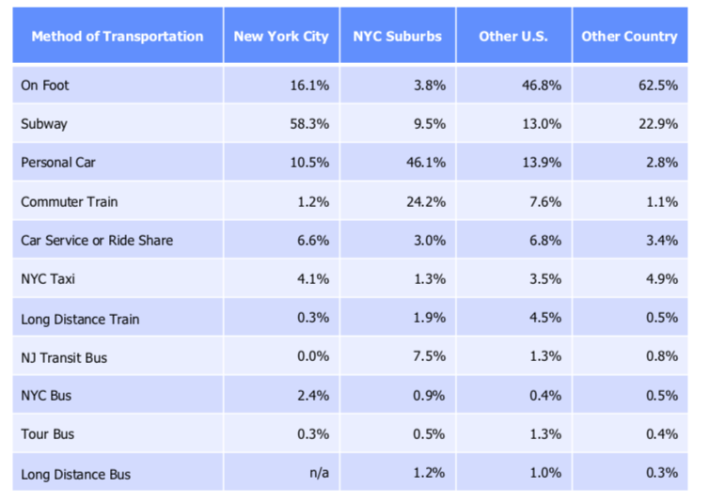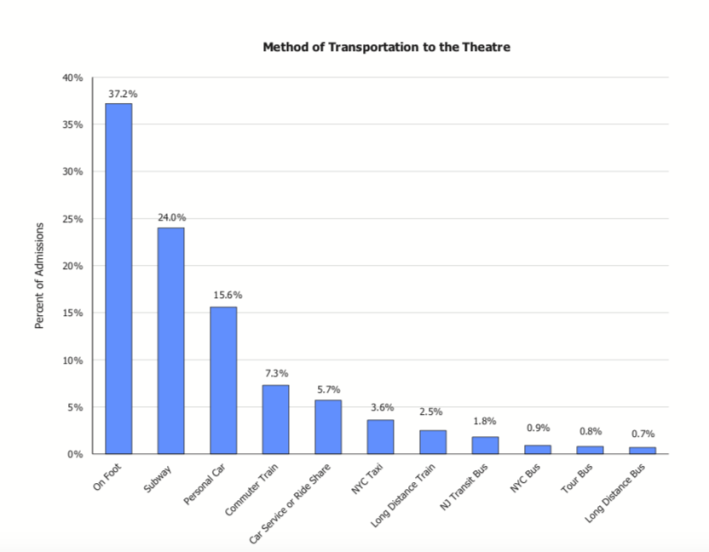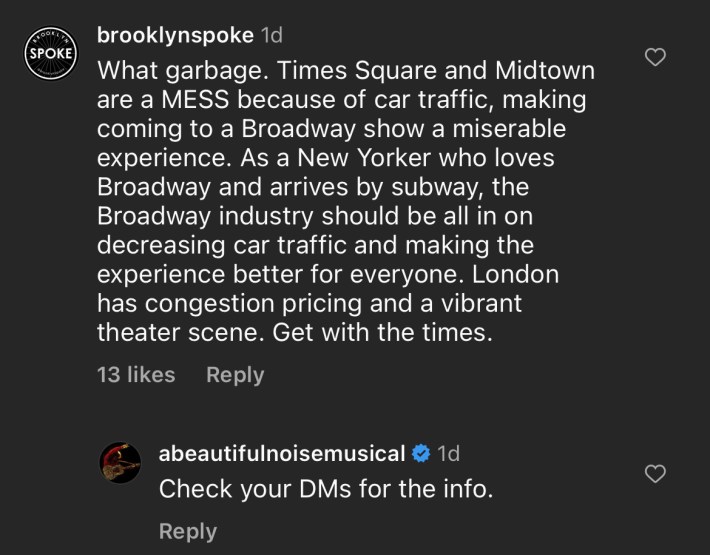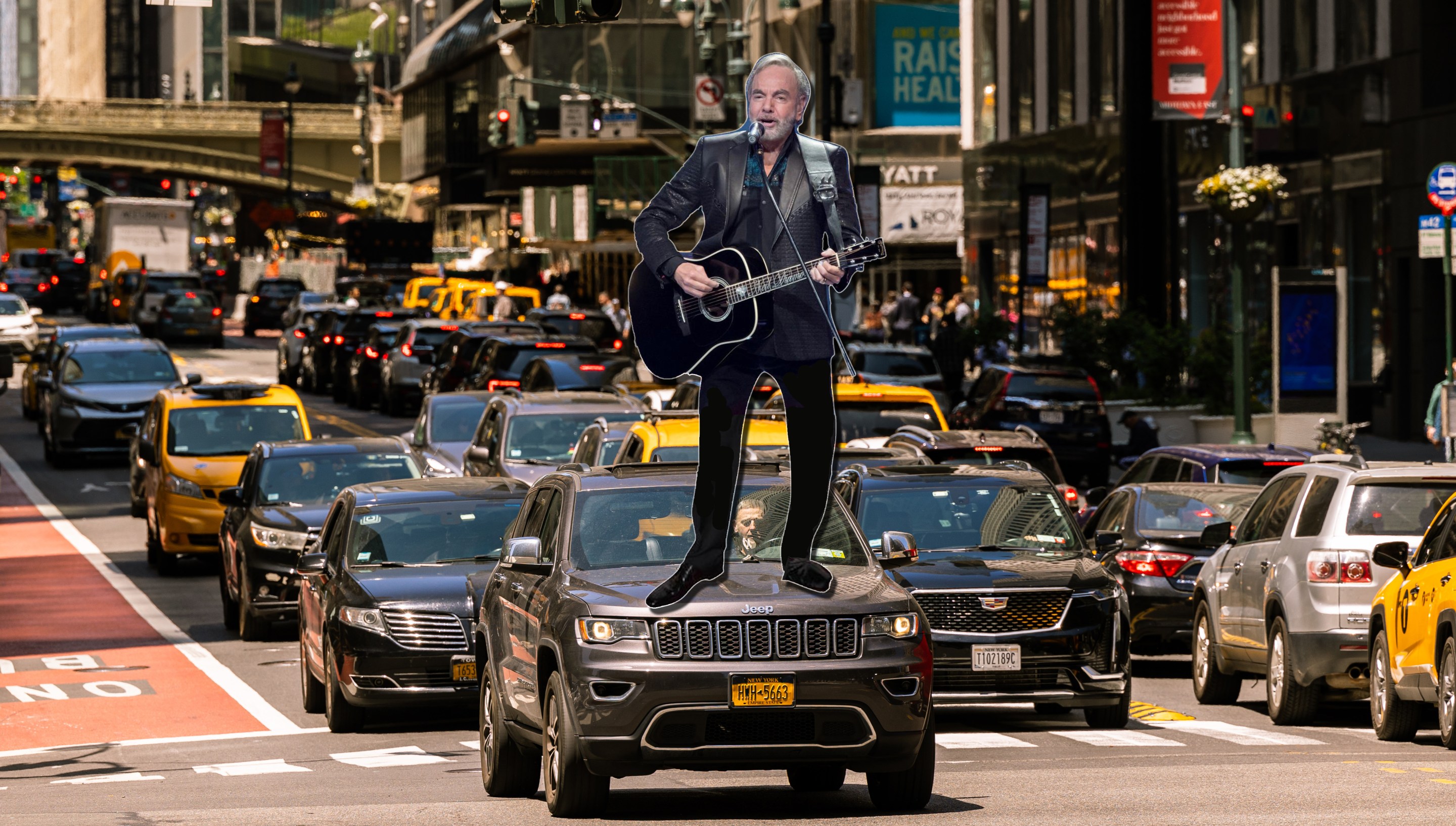It's a song sung blue: A Broadway producer is so opposed to congestion pricing that he'll refund the still-non-existent toll for drivers to see his show — contributing to the gridlock that turns the Theater District into a parking lot.
Producer Ken Davenport announced on Friday that he'll refund ticket buyers $15 — the proposed cost of congestion pricing — to see the Neil Diamond jukebox musical A Beautiful Noise during Broadway's notorious dark period between January and March.
"Don't let congestion pricing stop you from rockin' out with Neil Diamond!" the official account for the show and Davenport posted on Instagram. "When you buy a ticket to #ABeautifulNoise, we will cover the cost of your NYC congestion fees."
Would-be ticket buyers were told to type the word "CONGESTION" in the comments in order to receive the discount code.
Never mind that drivers won't begin paying tolls to enter the Theater District until at least May 2024, Davenport linked his discount to congestion pricing because of his tortured concerns that the toll "isn’t good for our recovery," as he put it in a blog post.
Davenport said he was spooked by the Broadway League's most recent Demographics of Broadway report, which showed that Broadway attendance during the Great White Way's first post-pandemic season in 2022-23 was down from its record 2018-19 season. Additionally, the report found that while suburban theatergoers comprise just 13.6 percent of Broadway attendees, 46.1 percent of the out-of-towners drove to see a play or musical.

According to Davenport, the lack of an immediate post-pandemic rebound to record-breaking crowds and suburbanites' affinity for driving into Midtown meant that congestion pricing would be the death of live theater without a publicity stunt like his.
But the discount also reeks of desperation to gin up sales during the slow period for the stage, which coincidentally lasts for the January to March duration of the discount when there isn't even a congestion pricing toll to deter a driver from the suburbs for a ticket to the best-of-Neil-Diamond collection, where tickets cost well over $100.
Davenport also seems to spend a lot of time fretting over what might slightly inconvenience 15 percent of his audience, while ignoring the 85 percent of theater fans who get to their shows on foot or on transit.

As a result, the entire stunt suggests another tiring example of arguing against congestion pricing by centering wealthier people who don't use public transit, such as the minuscule number of people who drive to lower Manhattan for work and don't live near rapid transit in the city or parking placard owners, instead of focusing on the overwhelming majority of New Yorkers who rely on and use the subway and bus to get around.
"I saw three Broadway shows this fall," said Charlie Todd, the founder of Improv Everywhere and a Hells Kitchen resident. "I walked to two of them and Citi Biked to the third. Our neighborhood is home to Broadway performers and crew members and deserves better than the gridlock we deal with every day. I'm looking forward to the congestion charge bringing safer streets and cleaner air to our community. Perhaps Broadway producers should be offering a NJ Transit discount instead."
As it happens, the MTA has partnered with Broadway and is currently offering a transit-themed discount for anyone seeing "Mary Poppins: The Musical" through the end of the year — a supercalifragilistic $10 discount off premium tickets with the code "LIRR."
The producers for "A Beautiful Noise" (which the anti-congestion pricing New York Post called "awful," "dull," "confounding" and "incomprehensible") have been leaning into the stunt. Everyone who includes "congestion" in the comments to the original Instagram post gets the discount code, including people who responded to the post with a critique of the whole thing, such as area livable streets activist Doug Gordon.
"London has congestion pricing and a vibrant theater scene," Gordon wrote, earning his discount code because he used the word "congestion."

The stunt is not unlike the raft of charges that appeared on restaurant bills after the Affordable Care Act passed or cities instituting rules like, "You cannot pay your staff in uneaten food." But Davenport's brainstorm may inspire copycats, said a longtime congestion pricing expert, who nonetheless shrugged it off at the risk of being a solitary man.
Congestion pricing is designed to price some, but not all, trips off the road, said longtime congestion pricing scholar Charles Komanoff. So, yes, a discount like the one for "A Beautiful Noise" could make a trip from the suburbs to Broadway worth it, even with the irritations of traffic and paying for parking near the theater. But Komanoff said the discount won't lead to a wave of drivers undoing the 15- to 20-percent reduction in traffic that will be made possible by congestion pricing.
Besides, the money paid by drivers doesn't vanish into thin air, it goes to transit.
"Plus, more fannies in Broadway seats is a good thing," said Komanoff. "Congestion pricing is going to be a big cultural shift that will launch lots of memes. This ploy is just one among what will be many."
Neither Davenport nor Diamond responded to a request for comment.






